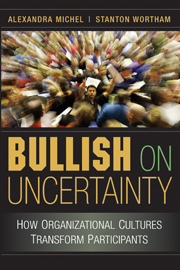Foreword by Kenneth J. Gergen
Published online by Cambridge University Press: 10 January 2011
Summary
One may detect a slow but profound shift in both the concept and practice of the contemporary organization. To be sure, the metaphor of the organization as pyramid continues to dominate, along with the familiar practices of command and control. However, as was once said of cultural modernism, it is dominant but dead. In the present context it is to say that we inherit organizational practices from the past, while simultaneously realizing that they are becoming increasingly ineffectual. And, because there is so little understanding of viable alternatives, a death-like atmosphere prevails. In the present work, Alexandra Michel and Stanton Wortham not only illuminate the problems with the traditional, modernist organization but also judiciously demonstrate the possibility for a viable field of alternatives through a powerful combination of theoretical reasoning and careful observation.
How are we to characterize this field of alternatives? Broadly put, the authors characterize the new organizational form as organization-centered. This is in contrast to the modernist organization in which the individual is the basic unit within the organizational machinery. In the organization-centered orientation, participants view each other not as isolated competitors but as resources. The stress on over-arching rules of action is replaced by a more situated or contingent view of what may be effective. The definition of the person as singular is replaced by an emphasis on multiplicity and plasticity. Any person may, at some point, be able to substitute for any other. The ethos of competition and conflict is replaced by an emphasis on collaboration.
- Type
- Chapter
- Information
- Bullish on UncertaintyHow Organizational Cultures Transform Participants, pp. ix - xiiPublisher: Cambridge University PressPrint publication year: 2008



